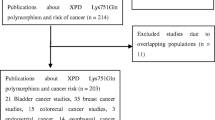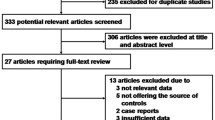Abstract
Purpose
The association between Asp312Asn and Lys751Gln polymorphisms of Xeroderma pigmentosum Group D (XPD) and prostate cancer risk are still inconclusive. For better understanding of the effects of these two polymorphisms on prostate cancer risk, a meta-analysis was performed.
Methods
An extensive search was performed to identify all case–control studies investigating such association. The strength of association between these two polymorphisms and prostate cancer risk was assessed by odds ratio (OR) with the corresponding 95 % confidence interval (95 % CI).
Results
A total of seven case–control studies were identified, among which five studies (1,257 cases and 1,956 controls) were eligible for Asp312Asn polymorphism and six studies (1,451 cases and 2,375 controls) were eligible for Lys751Gln polymorphism. Asp312Asn polymorphism was associated with an increased risk of prostate cancer in additive and recessive genetic models (additive model: OR = 1.68, 95 % CI = 1.28–2.22, P = 0.00; recessive model: OR = 1.65, 95 % CI = 1.27–2.15, P = 0.00). In the subgroup analysis, Asp312Asn polymorphism was associated with an increased risk of prostate cancer among Asians in all three genetic models (additive model: OR = 2.09, 95 % CI = 1.39–3.14, P = 0.00; dominant model: OR = 1.49, 95 % CI = 1.12–1.98, P = 0.01; recessive model: OR = 1.93, 95 % CI = 1.31–2.83, P = 0.00). However, no significant associations were found between Lys751Gln polymorphism and prostate cancer risk in the overall analyses or the subgroup analyses by ethnicity.
Conclusions
The results of this meta-analysis indicate that the XPD Asp312Asn polymorphism is a risk factor for prostate cancer development.


Similar content being viewed by others
References
Bau DT, Wu HC, Chiu CF et al (2007) Association of XPD polymorphisms with prostate cancer in Taiwanese patients. Anticancer Res 27:2893–2896
Benhamou S, Sarasin A (2005) ERCC2/XPD gene polymorphisms and lung cancer: a HuGE review. Am J Epidemiol 161:1–14
Brewster AM, Alberg AJ, Strickland PT, Hoffman SC, Helzlsouer K (2004) XPD polymorphism and risk of subsequent cancer in individuals with nonmelanoma skin cancer. Cancer Epidemiol Biomarkers Prev 13:1271–1275
Cochran WG (1954) The combination of estimates from different experiments. Biometrics 10:101–129
DerSimonian R, Laird N (1986) Meta-analysis in clinical trials. Control Clin Trials 7:177–188
Dhillon VS, Yeoh E, Fenech M (2011) DNA repair gene polymorphisms and prostate cancer risk in South Australia–results of a pilot study. Urol Oncol 29:641–646
Ding DP, Ma WL, He XF, Zhang Y (2012) XPD Lys751Gln polymorphism and esophageal cancer susceptibility: a meta-analysis of case-control studies. Mol Biol Rep 39:2533–2540
Egger M, Davey Smith G, Schneider M, Minder C (1997) Bias in meta-analysis detected by a simple, graphical test. BMJ 315:629–634
Friedberg EC (2003) DNA damage and repair. Nature 421:436–440
Goode EL, Ulrich CM, Potter JD (2002) Polymorphisms in DNA repair genes and associations with cancer risk. Cancer Epidemiol Biomarkers Prev 11:1513–1530
Higgins JP, Thompson SG, Deeks JJ, Altman DG (2003) Measuring inconsistency in meta-analyses. BMJ 327:557–560
Hirschhorn JN, Lohmueller K, Byrne E, Hirschhorn K (2002) A comprehensive review of genetic association studies. Genet Med 4:45–61
Itin PH, Sarasin A, Pittelkow MR (2001) Trichothiodystrophy: update on the sulfur-deficient brittle hair syndromes. J Am Acad Dermatol 44:891–920
Kiltie AE (2009) Molecular epidemiology of DNA repair genes in bladder cancer. Methods Mol Biol 472:281–306
Lavender NA, Komolafe OO, Benford M et al (2010) No association between variant DNA repair genes and prostate cancer risk among men of African descent. Prostate 70:113–119
Mandal RK, Gangwar R, Mandhani A, Mittal RD (2010) DNA repair gene X-ray repair cross-complementing group 1 and xeroderma pigmentosum group D polymorphisms and risk of prostate cancer: a study from North India. DNA Cell Biol 29:183–190
Mantel N, Haenszel W (1959) Statistical aspects of the analysis of data from retrospective studies of disease. J Natl Cancer Inst 22:719–748
Pabalan N, Francisco-Pabalan O, Sung L, Jarjanazi H, Ozcelik H (2010) Meta-analysis of two ERCC2 (XPD) polymorphisms, Asp312Asn and Lys751Gln, in breast cancer. Breast Cancer Res Treat 124:531–541
Ritchey JD, Huang WY, Chokkalingam AP et al (2005) Genetic variants of DNA repair genes and prostate cancer: a population-based study. Cancer Epidemiol Biomarkers Prev 14:1703–1709
Rybicki BA, Conti DV, Moreira A, Cicek M, Casey G, Witte JS (2004) DNA repair gene XRCC1 and XPD polymorphisms and risk of prostate cancer. Cancer Epidemiol Biomarkers Prev 13:23–29
Shen MR, Jones IM, Mohrenweiser H (1998) Nonconservative amino acid substitution variants exist at polymorphic frequency in DNA repair genes in healthy humans. Cancer Res 58:604–608
Sobti RC, Berhane N, Melese S et al (2012a) Impact of XPD gene polymorphism on risk of prostate cancer on north Indian population. Mol Cell Biochem 362:263–268
Sobti RC, Kaur S, Sharma VL, Singh SK, Hosseini SA, Kler R (2012b) Susceptibility of XPD and RAD51 Genetic Variants to Carcinoma of Urinary Bladder in North Indian Population. DNA Cell Biol 31:199–210
Synowiec E, Stefanska J, Morawiec Z, Blasiak J, Wozniak K (2008) Association between DNA damage, DNA repair genes variability and clinical characteristics in breast cancer patients. Mutat Res 648:65–72
Taylor EM, Broughton BC, Botta E et al (1997) Xeroderma pigmentosum and trichothiodystrophy are associated with different mutations in the XPD (ERCC2) repair/transcription gene. Proc Natl Acad Sci U S A 94:8658–8663
Weber CA, Salazar EP, Stewart SA, Thompson LH (1990) ERCC2: cDNA cloning and molecular characterization of a human nucleotide excision repair gene with high homology to yeast RAD3. EMBO J 9:1437–1447
Weeda G, Hoeijmakers JH (1993) Genetic analysis of nucleotide excision repair in mammalian cells. Semin Cancer Biol 4:105–117
Weiss JM, Goode EL, Ladiges WC, Ulrich CM (2005) Polymorphic variation in hOGG1 and risk of cancer: a review of the functional and epidemiologic literature. Mol Carcinog 42:127–141
Zhang J, Qiu LX, Leaw SJ, Hu XC, Chang JH (2011a) The association between XPD Asp312Asn polymorphism and lung cancer risk: a meta-analysis including 16,949 subjects. Med Oncol 28:655–660
Zhang Y, Ding D, Wang X, Zhu Z, Huang M, He X (2011b) Lack of association between XPD Lys751Gln and Asp312Asn polymorphisms and colorectal cancer risk: a meta-analysis of case-control studies. Int J Colorectal Dis 26:1257–1264
Conflict of interest
The authors declare no conflict of interest.
Author information
Authors and Affiliations
Corresponding author
Additional information
Shao-Guang Liao and Lu Liu equally contributed to this study.
Rights and permissions
About this article
Cite this article
Liao, SG., Liu, L., Wang, Y. et al. XPD Asp312Asn polymorphism is a risk factor for prostate cancer. J Cancer Res Clin Oncol 138, 1689–1695 (2012). https://doi.org/10.1007/s00432-012-1246-7
Received:
Accepted:
Published:
Issue Date:
DOI: https://doi.org/10.1007/s00432-012-1246-7




